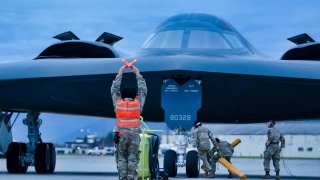Nothing: A Kamala Harris North Korea Strategy That Could 'Change Everything'
Continuing to wait for North Korea to dismantle its nuclear weapons could allow the country to alter the dynamics of U.S. extended deterrence on the Korean Peninsula: by doing nothing, President Harris could, paradoxically, change everything.
With Kamala Harris, U.S. Could Continue to Change Korea by Doing Nothing: Vice President Kamala Harris enters politics from a background in law, which means her focus is on what is right and wrong rather than on what is realistic or merely good enough. According to the eminent American political scientist Stephen D. Krasner, this poses a problem: the U.S. must learn to settle for "good enough" solutions when optimal ones are unavailable. Harris also serves as vice president in a government that has just renewed its stubborn, obsessive commitment to North Korea’s denuclearization. According to Ifang Bremer, this implies that the basic premise of U.S. foreign policy will persist if Vice President Harris is elected the next President of the United States. Deterrence and sanctions will remain the primary tools to achieve the total denuclearization of North Korea, and diplomacy and negotiation on other security matters cannot commence until the main issue of denuclearization is resolved.
North Korea and Nuclear Weapons
North Korea’s possession of nuclear weapons may not be ideal for global security, nor does it comply with the stipulations of the Non-Proliferation Treaty (NPT)of 1968/1970. Yet, it is a reality that North Korea’s leaders and legal framework assert can no longer be changed.
Continuing to wait for North Korea to dismantle its nuclear weapons could allow the country to alter the dynamics of U.S. extended deterrence on the Korean Peninsula: by doing nothing, President Harris could, paradoxically, change everything.
Strategic thinkers in the U.S. military have begun to recognize North Korea’s ongoing development of nuclear warfighting capabilities. For example, the top U.S. military official in South Korea, Gen. Paul J. LaCamera, believes that instead of compelling North Korea to denuclearize, the U.S. should now focus on preventing Kim Jong Un from using these weapons. On the one hand, General LaCamera aligns with recent academic reasoning, which suggests that the U.S. should improve its deterrence strategy by reassuring North Korea that the U.S. will not initiate aggression, “We have to assure him that positive will be met with positive actions, and negative will be met with negative.”
If North Korea fears unprovoked U.S. aggression, there is no reason for it to refrain from its aggression, especially if proactive policies minimize the damage North Korea would suffer. Only if North Korea knows that the U.S. will not attack first will it be rational for North Korea to avoid initiating near-suicidal, preemptive missions. Thus, North Korea needs to understand that “negative will be met with negative.”
Tactical Nuclear Weapons and North Korea: A New Challenge
On the other hand, the likelihood of North Korean nuclear weapons use may increase as its development of tactical nuclear weapons has not been adequately addressed in U.S. diplomacy. Suppose North Korea can counter South Korea's conventional superiority with an effective nuclear warfighting capability. In that case, it may mistakenly believe it can deter U.S. interference in an intra-Korean war or nuclear blackmail due to its capacity to strike the U.S. with intercontinental nuclear weapons.
While North Korea would suffer much more than the U.S. in a war between the two, it might seem rational for North Korea to avoid risking a war with the U.S. However, the sequencing of moves changes the logic of rationality: once North Korea has already attacked South Korea, the United States would face a decision between allowing the collapse of the credibility of extended deterrence, perhaps globally, and risking the destruction of some of its multi-million inhabitant cities.
What Theory Tells Us
If it is unlikely that the U.S. would choose the latter, the entire strategy of extended deterrence loses its credibility. To do nothing while developments move toward a situation where U.S. resolve to defend its allies at the cost of millions of American lives could be tested seems irrational. Some of the canonical texts on the Theory of Deterrence by Reinhard Selten and Herman Kahn suggest that this is exactly what it is. These theorists would recommend that the U.S. quickly begin trading sanctions for North Korea’s willingness to halt the development of its tactical nuclear warfighting capability. However, it is unlikely that Kamala Harris would pursue such a strategy, given her commitment to the unrealistic policies of the current administration and her legal background, which emphasizes principles over pragmatism.
About the Author:
Timo Kivimaki is a Professor of International Relations at the University of Bath (UK) and a Senior Non-Resident Fellow at the Sejong Institute (Seoul, Republic of Korea). Professor Kivimäki joined the University of Bath in January 2015. Previously he has held professorships at the University of Helsinki, the University of Lapland, and at the University of Copenhagen. Professor Kivimäki has also been director of the Nordic Institute of Asian Studies (Copenhagen) and the Institute of Development Studies of the University of Helsinki.
Image Credit: Creative Commons.


